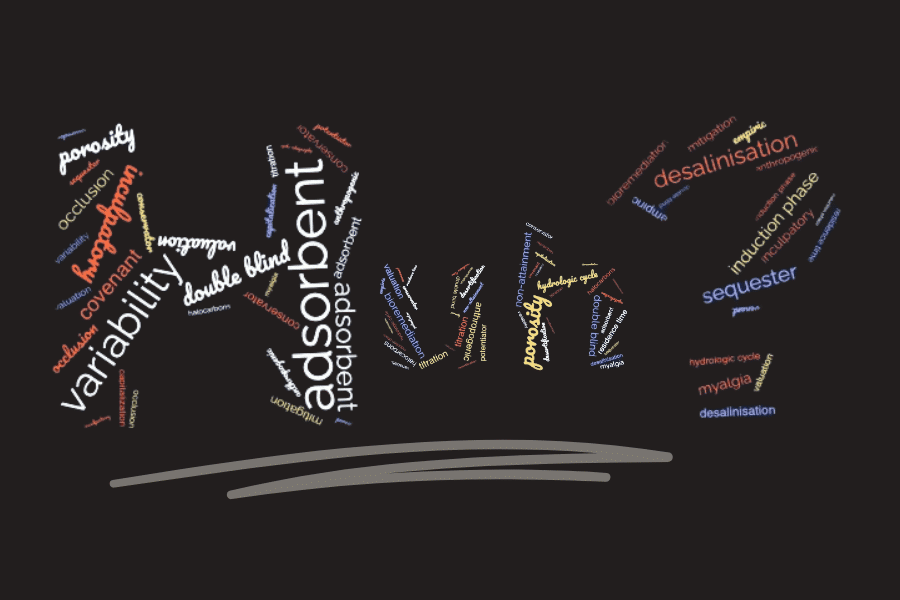Within professions, people use terminology to be precise. But for communication, clarity requires simple language.

A confusion of terminology forms the word Huh? (Illustration by News Decoder)
This article was produced exclusively for News Decoder’s global news service. It is through articles like this that News Decoder strives to provide context to complex global events and issues and teach global awareness through the lens of journalism. Learn how you can incorporate our resources and services into your classroom or educational program.
In English lessons and media classes, people are taught to appreciate good language, and to to make their writing clear and elegant.
But as soon as they go to work at a big organisation, they find their colleagues speaking unintelligible gobbledegook. Is this the way up the career ladder? To succeed must you crank out company jargon?
Uneducated people have a limited vocabulary, but it turns out that the highly educated can also operate with a few hundred words that they repeat among themselves. Before you know it, in a new job you are “building ecosystems through a diversity lens” and “leveraging narratives for a multi-stakeholder outcome”.
With buzzwords like that, just imagine the impact you could have!
Of course, jargon and acronyms have their uses as shortcuts among specialists. But they also have a terrible deadening effect. Did you know that children in Gaza are now being referred to as WCNSFs? It stands for “wounded child, no surviving family”.
That may help hospitals or aid agencies to triage in emergencies but do you really want to talk like that?
Clarity versus confusion
Most international organisations are well meaning but their jargon can border on the inhuman — and they want everyone to use it, like a choir. One that I recently worked for put a lot of emphasis on team members “aligning” their language. This is a misconception.
Agreement is needed on decisions and policies should not contradict each other. But we must constantly be looking for new and different ways of describing what we are doing, otherwise we fall into oft-repeated cliches and end up sounding like a congress of the old Communist Party of the Soviet Union.
Language is a living thing and it is our job as communicators to keep it fresh.
In government departments, language can be so dense and turgid that you might think the bureaucrats are deliberately trying to confuse the public, or put them off entirely. Of course, propagandists and unscrupulous advertisers do use words to fool us. But in most organisations, there is not that degree of ill intent.
So how do they come to spew out so much rubbish?
Collaboration and consensus
Collegiality can complicate communications. Organisations stress collaboration and consensus but when you have a large group of people trying to agree on a text, the result will be as indigestible as a thick broth, spoilt by too many cooks.
Instead, choose one writer to speak for the whole team and one or two, maximum three people to fact check and edit. Because, as the old saying goes, if you gather a committee to design a horse, you will end up with a camel.
Insecurity is another reason why employees churn out company-speak — they think it makes them look serious or loyal. And non-native speakers might adopt it in the hope of avoiding mistakes with their English. But none of this helps. Only by speaking naturally will you really succeed.
You may make grammatical errors but don’t worry — they can easily be fixed. What is more difficult to correct is a poorly structured text — the result of woolly thinking — or a text so full of buzzwords that the reader simply does not know what you are talking about.
If you have reached the point where you yourself do not know what you are talking about, then you need an urgent detox. Some young employees have said my writing training helped them understand their own work, so lost had they become in the jungle of jargon.
So when you are entangled in meaningless words, you need to get back to basics. Why did you want to communicate in the first place? Presumably because you wanted to be understood. For this, you need to have a clear idea of who you are talking to.
Remember, communication takes place on the terms of the reader or audience. If they have not understood what you said, or if they got bored and switched off, you have not communicated at all but only wasted your breath.
Three questions to consider:
- What is jargon?
- What purpose does jargon serve?
- Why should people avoid using jargon and complicated terminology in reports and articles?

From column writing, British-born Helen Womack went on to write a book about her experiences in Russia: “The Ice Walk – Surviving the Soviet Break-Up and the New Russia”. From 1985 to 2015, Womack reported from Moscow for the Reuters international news agency as well as The Independent, The Times and the Fairfax newspapers of Australia. Now based in Budapest, she covers the European Union’s relatively new eastern members. Since the refugee crisis of 2015, she has written for the United Nations Refugee Agency, UNHCR, about how refugees are settling in Europe.
